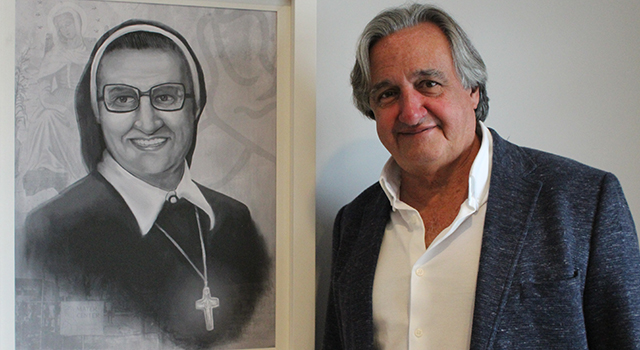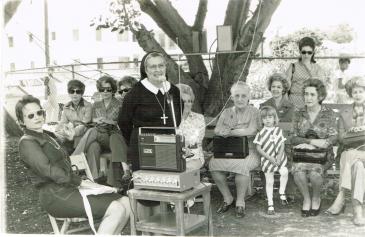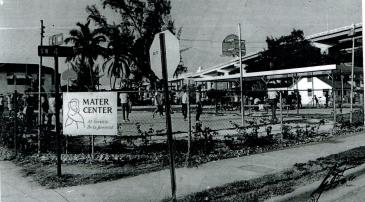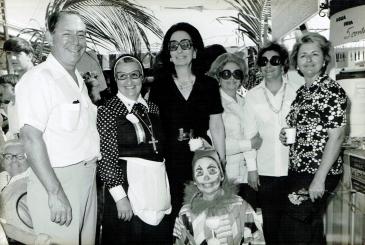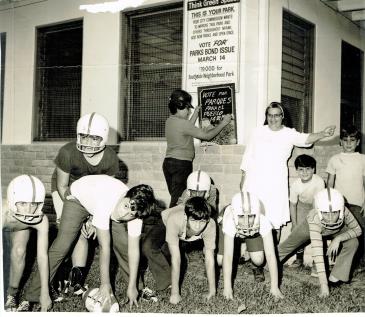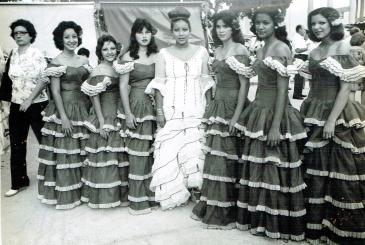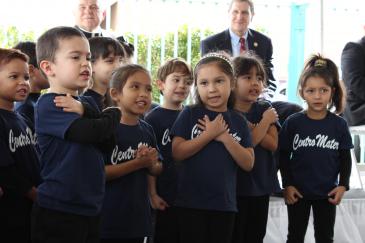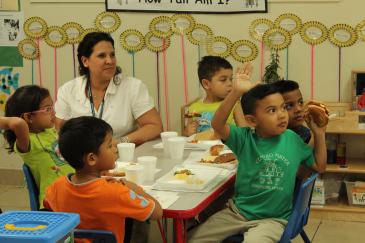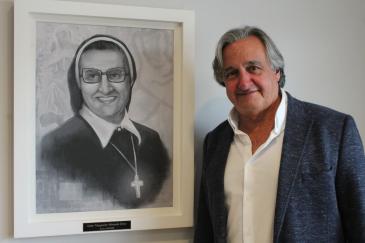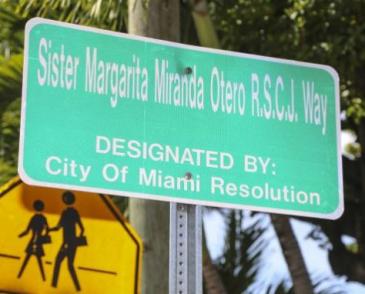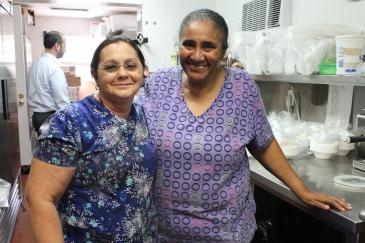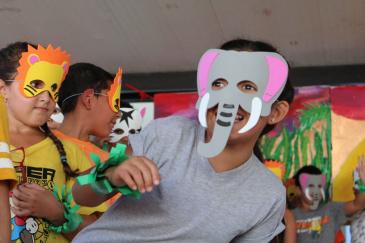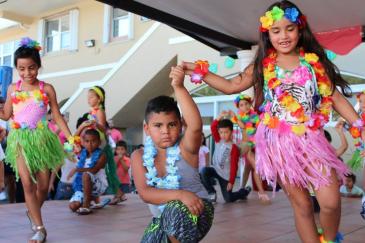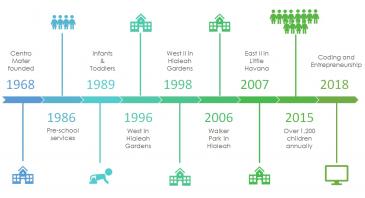By Cristina Cabrera Jarro -
Photography: FILE PHOTOS
MIAMI | Jasmine de la Osa is in love with her school. “I love Centro Mater because I get to see and play with my best friend Mioki, and it has the best platanitos maduros.”
Her mother, Marbelys de la Osa, points out that her 5-year-old’s priorities are currently playing and eating. But those should be every child’s priorities, said de la Osa, communications coordinator for the Centro Mater Foundation and Centro Mater Childcare Services.
In that sense, Centro Mater has succeeded far beyond the expectations of its foundress, Mother Margarita Miranda.
Over the past 50 years, de la Osa said, Mother Margarita’s dream of offering afterschool services to keep young people off the streets has grown to offering childcare to children from six weeks to 12 or 13 years old, while at the same time empowering their families as a whole, regardless of nationality, faith or race.
“People want to bring their kids here because they know they are safe here, they’re going to be fed good, nutritious food, they’re going to be doing enriching activities, and they’re going to be taken care of,” de la Osa said. “It’s a quality program.”
Centro Mater’s programs include early childhood care, preschool education, afterschool care, nutrition and developmental assistance, parent-focused instruction and summer programs. Ninety-nine percent of those served are Hispanic and nearly as many speak only Spanish at home. Nearly all of the families served � 99.8 percent � are low-income.
Centro Mater estimates that it has served more than 50,000 children and their families over the past half century. Many of those who have been helped are now giving back.
From latchkey kid to board member
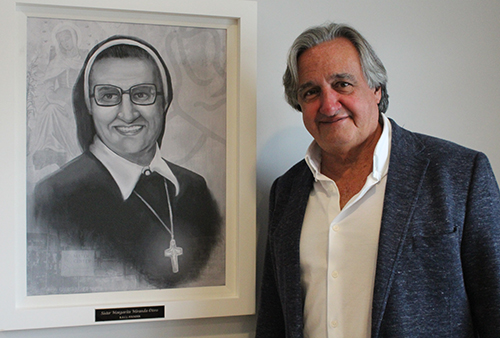
Photographer: CRISTINA CABRERA JARRO| FC
Augusto Vidaurreta was part of the original batch of Centro Mater latchkey kids that Mother Margarita Miranda Otero invited in from the streets. Fifty years later, he sits on the Centro Mater Foundation board of directors.
In 1968, Augusto Vidaurreta was an immigrant Cuban teen growing up in southwest Miami. His neighborhood, known today as Little Havana, was known then as Little Vietnam.
“The Vietnam War was raging, and this area was, too,” Vidaurreta said.
There weren’t drugs in the streets, at least none he can recall, but it was a violent place where people had to walk the streets looking over their shoulders.
As a latchkey kid � one who comes home from school to no parental supervision because the parents are working � he wandered the streets with his friends, who were also latchkey kids. Though they were often together, a neighborhood bully began targeting them, someone Vidaurreta describes as “very insane and dangerous.”
Unbeknownst to him and his friends, a positive change had just arrived in the neighborhood, in the form of a Cuban nun with a little wooden house and some land: Mother Margarita Miranda Otero, of the Society of the Sacred Heart.
“If I wasn’t the first person who walked in to Centro Mater, I was close,” Vidaurreta said. “I walked in on day one.”
He remembers that day with vivid detail. He was walking alone through the streets worried about the bully, and decided to cross the street to Mother Margarita’s little house. She beckoned him in and told him, “I’m trying to build something here. A place where children who finish school can come over and hang out in a protective environment.”
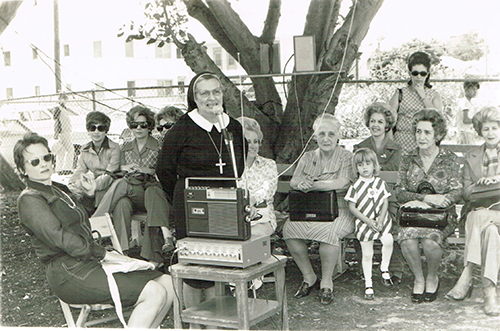
Photographer: COURTESY PHOTO
Mother Margarita Miranda Otero hosts a neighborhood meeting during the 1970s on the grounds of Centro Mater East in Little Havana.
As soon as he heard protective environment, Vidaurreta said he knew that the one person the bully would not mess with would be this nun. He stayed for a while with her that day, then ran off to tell his friends about the “oasis” he had found. They couldn’t believe that a nun dressed in a habit would be their saving grace, but Vidaurreta insisted. “This guy is not going to mess with her.”
They returned the day after to help clean up the shack and its surroundings, even taking time to paint the house. And doing so, they opened the doors for so many latchkey kids who came after them.
At 15 he entered Coral Gables High School, got involved in academics and soccer, and got a delivery job with the Miami Herald. He kept some ties with Centro Mater, and even worked a few “Fiesta Guajira” parties. They were Mother Margarita’s way of fundraising and uniting the neighborhood in what he describes as “campy and fun” festivities celebrating Cuban culture. But he found that it was time to move on.
In a way, Vidaurreta regrets that he did not stay longer. “I look back and I think, why would I have left?”
Years later, he began attending the Centro Mater galas and was asked to join its foundation’s board of directors, “a beautiful group of altruistic people who have done pretty well,” Vidaurreta said. “What I really like is the attitude from everyone that we are doing this so that these children can sit in our chairs 25 years from now. We want to create the opportunity for these children to get to that position, too.”
Growing up, Vidaurreta admits, he didn’t know or think about those opportunities. Now he wants to make sure all the children at Centro Mater, and their families, realize the endless possibilities that are available to them, regardless of their life circumstances.
“Centro went from an after-school hangout for older kids and teens, with the spiritual support and guidance of a nun who was incredibly friendly, to a place where now there are over 1,200 children, from six weeks to 12 years, in five campuses, where we help families in need, we provide education, we provide food � Sister had none �, provide support, and an afterschool program,” he said.
Vidaurreta believes there are moments in life where everything goes right and you want to capture them forever. His encounter with Sister Margarita was just that: a moment in time that changed him.
“She knew how to create electric moments, and I thank her for it,” he said.
Opportunities for a better life
If you ask kids at Centro Mater who Asusena Valdes is, they will have no idea. If you ask them who “Susy” is, they will nod their heads, smile and cheer because they know, along with her name, something delicious is on its way.
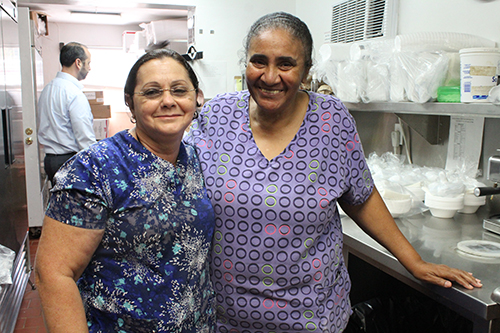
Photographer: CRISTINA CABRERA JARRO| FC
Keeping the kids happy and well fed are Centro Mater's cooks Lourdes Palacios, left, and Asusena "Suzy" Valdes, who has worked at Centro Mater East for 28 years.
“The advantage of working in the kitchen, which I often tell teachers, is that all children love to eat. And since they love to eat, who cooks the food? The cook,” said Valdes, who has worked at Centro Mater East for 28 years.
Her six children have attended the programs, and as is true with many Centro Mater families, so have her 11 grandchildren. Three are still young enough to be in afterschool care, and the older ones return to help out and acquire volunteer hours for school.
“I love going to Centro to see all of my friends and loving teachers,” said Angela Hernandez, one of Asusena’s granddaughters. “I love being in the same place as my grandma.”
Valdes’ journey with Centro began like that of many families in the area: She was an immigrant from Cuba, newly arrived in Miami in 1980, looking for a new and better life. In Cuba, she had been studying to be a teacher.
She found Centro Mater, walked in and applied. Her first job was as a volunteer, helping where needed. She also enrolled her children, who at first qualified for enough financial assistance to attend for free. As times and her finances changed, she negotiated a feasible payment plan so that her children could continue attending.
“Centro has always given good help to all of those in need, always within hands reach,” Valdes said.
Then a fulltime position opened in Centro Mater’s kitchen, and Valdes has been there ever since. “They thought, thank God, in me. That doesn’t happen in too many jobs, and that is how opportunities are given here at Centro.”
FIND OUT MORE
For more information visit:
- call 305-545-6049, or
- visit on Facebook @CentroMater.
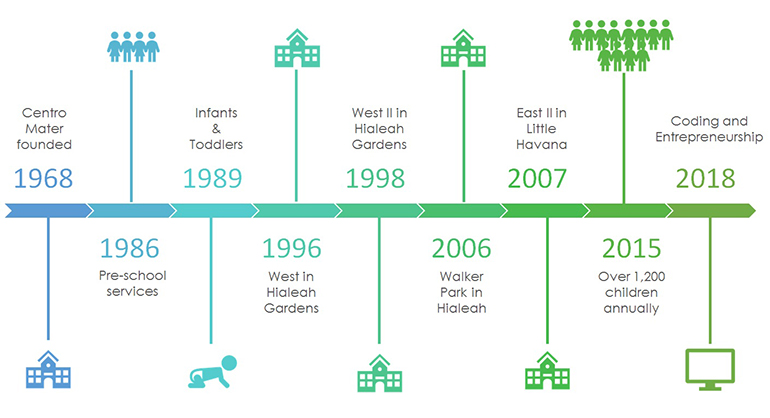
Photographer: COURTESY PHOTO
A timeline of Centro Mater's milestones since it first opened its doors in 1968.
